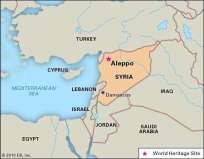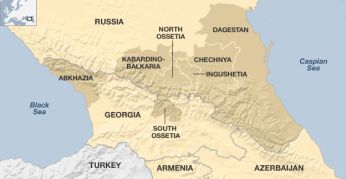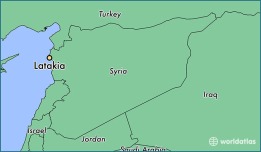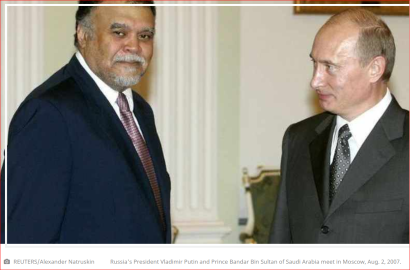“We understand the importance of the Russian gas pipeline to Europe. We are not interested in competing with that. We can cooperate in this area,” he [Saudi Bandar bin Sultan] said, purporting to speak with the full backing of the US.”
8/27/2013, “Saudis offer Russia secret oil deal if it drops Syria,” Telegraph UK, Ambrose Evans-Pritchard
 “[In 2013] Saudi Arabia has secretly offered Russia a sweeping deal to control the global oil market and safeguard Russia’s gas contracts, if the Kremlin backs away from the Assad regime in Syria.” [Russian military didn’t enter Syria until Sept. 30, 2015 as Damascus was about to fall to terrorists. Syria’s president had asked his neighbor and friend Russia to help remove the terrorists which Russia agreed to do. John Kerry says US had hoped terrorists would take Damascus, but Russia prevented that].
“[In 2013] Saudi Arabia has secretly offered Russia a sweeping deal to control the global oil market and safeguard Russia’s gas contracts, if the Kremlin backs away from the Assad regime in Syria.” [Russian military didn’t enter Syria until Sept. 30, 2015 as Damascus was about to fall to terrorists. Syria’s president had asked his neighbor and friend Russia to help remove the terrorists which Russia agreed to do. John Kerry says US had hoped terrorists would take Damascus, but Russia prevented that]. “The revelations come amid high tension in the Middle East, with US, British, and French warships poised for missile strikes in Syria. Iran has threatened to retaliate.
The strategic jitters pushed Brent crude prices to a five-month high of $112 a barrel. “We are only one incident away from a serious oil spike. The market is a lot tighter than people think,” said Chris Skrebowski, editor of Petroleum Review.
Leaked transcripts of a closed-door meeting between Russia’s Vladimir Putin and Saudi Prince Bandar bin Sultan shed an extraordinary light on the hard-nosed Realpolitik of the two sides.
Prince Bandar, head of Saudi intelligence, allegedly confronted the Kremlin with a mix of inducements and threats in a bid to break the deadlock over Syria. “Let us examine how to put together a unified Russian-Saudi strategy on the subject of oil. The aim is to agree on the price of oil and production quantities that keep the price stable in global oil markets,” he said at the four-hour meeting with Mr Putin. They met at Mr Putin’s dacha outside Moscow three weeks ago.
“We understand Russia’s great interest in the oil and gas in the Mediterranean from Israel to Cyprus. And we understand the importance of the Russian gas pipeline to Europe. We are not interested in competing with that. We can cooperate in this area,” he said, purporting to speak with the full backing of the US.
The talks appear to offer an alliance between the OPEC cartel and Russia, which together produce over 40m barrels a day of oil, 45pc of global output. Such a move would alter the strategic landscape.
The details of the talks were first leaked to the Russian press. A more detailed version has since appeared in the Lebanese newspaper As-Safir, which has Hezbollah links and is hostile to the Saudis.
[Lebanese newspaper] As-Safir said Prince Bandar pledged to safeguard Russia’s naval base in Syria if the Assad regime is toppled, but he also hinted at Chechen terrorist attacks on Russia’s Winter Olympics in Sochi if there is no accord. “I can give you a guarantee to protect the Winter Olympics next year. The Chechen groups that threaten the security of the games are controlled by us,” he allegedly said.
Prince Bandar went on to say that Chechens operating in Syria were a pressure tool that could be switched on an off. “These groups do not scare us. We use them in the face of the Syrian regime but they will have no role in Syria’s political future.” President Putin has long been pushing for a global gas cartel, issuing the `Moscow Declaration’ last to month [July 2013] “defend suppliers and resist unfair pressure”. This would entail beefing up the Gas Exporting Countries Forum (GECF), a talking shop.
[Petroleum Review’s] Mr Skrebowski said it is unclear what the Saudis can really offer the Russians on gas, beyond using leverage over Qatar and others to cut output of liquefied natural gas (LGN). “The Qataris are not going to obey Saudi orders,” he said.
Saudi Arabia could help boost oil prices by restricting its own supply. This would be a shot in the arm for Russia, which is near recession and relies on an oil price near $100 to fund the budget.
But it would be a dangerous strategy for the Saudis if it pushed prices to levels that endangered the world’s fragile economic recovery. Crude oil stocks in the US have already fallen sharply this year. Goldman Sachs said the “surplus cushion” in global stocks built up since 2008 has been completely eliminated.
 Mr Skrebowski said trouble is brewing in a string of key supply states. “Libya is reverting to war lordism. Nigerian is drifting into a bandit state with steady loss of output. And Iraq is going back to the sort of Sunni-Shia civil war we saw in 2006-2007,” he said.
Mr Skrebowski said trouble is brewing in a string of key supply states. “Libya is reverting to war lordism. Nigerian is drifting into a bandit state with steady loss of output. And Iraq is going back to the sort of Sunni-Shia civil war we saw in 2006-2007,” he said. The Putin-Bandar meeting was stormy, replete with warnings of a “dramatic turn” in Syria. Mr Putin was unmoved by the Saudi offer, though [US] western pressure has escalated since then. “Our stance on Assad will never change. We believe that the Syrian regime is the best speaker on behalf of the Syrian people, and not those liver eaters,” he said, referring to footage showing a Jihadist [terrorist] rebel eating the heart and liver of a Syrian soldier.
Prince Bandar in turn warned that there can be “no escape from the military option” if Russia declines the olive branch. Events are unfolding exactly as he foretold.”
…………………………………………..
Added: More on Saudis’ fellow Sunni Chechen Islamic terrorist fighters in Syria:…Chechens back home in the Caucasus hoped their fighters would come back from Syria and create terror at the Sochi Olympics:
June 22. 2014, “A View of Chechens in Syria,” thestrategybridge.org, Brandee Leon
......
 “Chechen [Islamic terrorist] fighters have been on the forefront of some major attacks inside Syria. The February 2014 attack on Aleppo
Central Prison by JAN and Islamic Front involved many Chechens, and was
the battle where Sayfullakh Shishani was mortally wounded. Chechen fighters have been major players in fighting in Latakia, as well. Perhaps the most well known operation involving the Chechen factions was the 2012/2013 attack and eventual siege of the Menegh Air
“Chechen [Islamic terrorist] fighters have been on the forefront of some major attacks inside Syria. The February 2014 attack on Aleppo
Central Prison by JAN and Islamic Front involved many Chechens, and was
the battle where Sayfullakh Shishani was mortally wounded. Chechen fighters have been major players in fighting in Latakia, as well. Perhaps the most well known operation involving the Chechen factions was the 2012/2013 attack and eventual siege of the Menegh AirBase in northern Syria. JAM was a leading force, along with [Islamic terrorists] JAN, ISIL [ISIS] and the [terrorist] Free Syrian Army, in taking the air base.
The takeover of the air base, and the subsequent treatment of captured Syrian military personnel, showed what many already knew, the brutality of Chechen jihadis. Those who were captured were summarily executed, their throats slit then beheaded. Others were merely lined up, placed on their knees, and shot in the back of the head. Some fighters even proudly recorded their feats. The Chechen fighters are earning a reputation as some of the most ruthless, but best fighters in Syria….Chechens also reportedly make up about a tenth of the ISIL [ISIS] forces fighting in both Syria and Iraq. Remember, this is a group so extreme in its actions that even one-time ally al Qaeda disavowed them….
......
 [Map: North Caucasus region including Chechnya, BBC]
[Map: North Caucasus region including Chechnya, BBC] Fighting in Syria against a major Russian ally could be the combat training the Chechens use to renew the insurgency in the Caucasus….One hope was that the fighters would come back and focus their efforts on the Sochi Olympics. Despite threats, the Games went off without incident….
Another thing to consider is who or what is funding the Chechen fighters. [Per above Telegraph article, Saudi freely admits controlling Chechen fighters in Syria]. As far back as 2000, there have been claims of Saudi Arabia financing fighters in Chechnya….As both the Saudis and the Chechen Islamists are Wahhabi Sunnis, it is not impossible to think the former would be helping the latter defeat the Syrian Alawites. Saudi Arabia has, financed or at the very least hosted terrorists in the past. We cannot forget that many of the September 11 hijackers were Saudis.”…
.......

Added: Linked in UK Telegraph article above
8/22/2013, “Russian President, Saudi Spy Chief Discussed Syria, Egypt,” al-monitor.com…[al-monitor is DC based]

.......
Reuters image via al-monitor
............
No comments:
Post a Comment